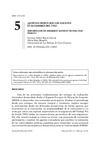Identificador persistente para citar o vincular este elemento:
https://accedacris.ulpgc.es/jspui/handle/10553/70088
| Título: | ¿Quiénes deben ser los agentes evaluadores del TFG? | Otros títulos: | Who should be the assessment agents of the final year project? | Autores/as: | Reyes García, Carmen Isabel Díaz Megolla, Alicia |
Clasificación UNESCO: | 5802 Organización y planificación de la educación | Palabras clave: | Final Year Project Formative assessment Higher Education Learning Assessment Self-Assessment, et al. |
Fecha de publicación: | 2020 | Publicación seriada: | Educacion XX1 | Resumen: | One of the fundamental principles of the alternative assessment approach demanded by the European Higher Education Area (EHEA) is the participation of the agents involved in the assessment. Assessing learning from this approach, in an integral and formative way, involves collecting information from the different perspectives of the agents involved in the assessment process. The assessment agents are an issue that takes on special importance in the subject of Final Year Project (FYP) given its contextual characteristics: the difficulty involved in assessing a subject consisting mainly of a large number of transversal competences, the wide range of different formats that can be used to assess, and the diversity of agents involved in the assessment of the FYP (board, teacher-tutor as well as other professionals from companies or external institutions, and students). Therefore, our work focuses on analyzing the assessment agents established by the regulations of the Spanish public universities to verify, if this enhances a participatory and democratic assessment as claimed from the EHEA. A descriptive study was conducted through the analysis of documents and regulations governing the FYP in Spanish public universities used as units of analysis. The results of this study indicate that the normative framework of the assessment of the FYP does not encourage a participatory assessment since, in most universities, the responsibility lies on the boards. While the student as an assessment agent is ignored and the tutor playsonly a formative role and only a few universities develop a summative role of the assessment. For this reason, Spanish universities have a challenge for the future: modify the regulations of the FYP and guide it towards the promotion of a participatory assessment. Uno de los principios fundamentales del enfoque de evaluación alternativo demandado desde el Espacio Europeo de Educación Superior (EEES) es desarrollar una evaluación participativa. Evaluar el aprendizaje desde este enfoque, de manera integral y formativa, implica recoger la información desde las diferentes perspectivas de los/las agentes que intervienen en la evaluación. La responsabilidad de la evaluación es un tema que cobra una especial importancia en la asignatura del Trabajo Fin de Grado (TFG) dadas las características particulares de esta asignatura. Por ello, nuestro trabajo se centra en ofrecer una propuesta de evaluación participativa y analizar los agentes evaluadores que establece la normativa de las universidades públicas españolas para comprobar si esta potencia una evaluación participativa y democrática como se reclama desde el EEES. Para ello se realizó un estudio descriptivo mediante el análisis de documentos y se emplearon como unidades de análisis las normativas que regulan la evaluación del TFG en las universidades públicas españolas. Los resultados de este estudio indican que el marco normativo de la evaluación del TFG no fomenta una evaluación participativa, ya que, en la mayor parte de las universidades la responsabilidad recae en el tribunal. Mientras que el alumnado como agente evaluador es ignorado y la persona que ejerce la tutoría desempeña únicamente una función formativa y solo, en unas pocas universidades desarrolla una función sumativa de la evaluación. Por este motivo, las universidades españolas tienen un reto de cara al futuro: modificar la normativa del TFG y orientarla hacia la promoción de una evaluación participativa. |
URI: | https://accedacris.ulpgc.es/handle/10553/70088 | ISSN: | 1139-613X | DOI: | 10.5944/educXX1.23843 | Fuente: | Educacion XX1 [ISSN 1139-613X], v. 23 (1), p. 125-145 |
| Colección: | Artículos |
Citas SCOPUSTM
7
actualizado el 08-jun-2025
Citas de WEB OF SCIENCETM
Citations
6
actualizado el 08-jun-2025
Visitas
140
actualizado el 04-may-2024
Descargas
102
actualizado el 04-may-2024
Google ScholarTM
Verifica
Altmetric
Comparte
Exporta metadatos
Los elementos en ULPGC accedaCRIS están protegidos por derechos de autor con todos los derechos reservados, a menos que se indique lo contrario.
